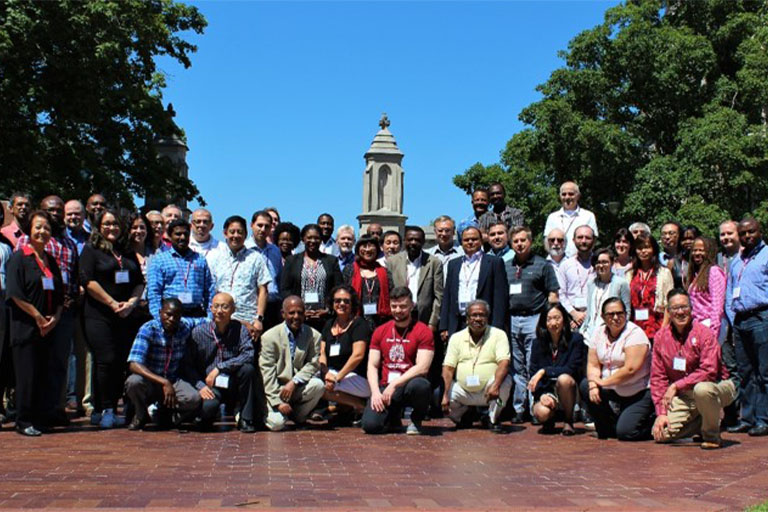Indiana University received a $1.66 million five-year grant in 2015 from the Department of the Navy to develop a robust and innovative model to train diverse STEM (Science, Technology, Engineering, and Mathematics) researchers at IU. In partnership with an alliance of minority-serving institutions (MSIs), the initiative strengthened the pipeline of students interested in pursuing STEM fields by inspiring, engaging, and educating the next generation of scientists and engineers.
The grant was distributed in equal parts over five years with three primary goals. To invite 20 minority-serving institution partners into the initiative, to engage 60 faculty in research collaborations, and to have 15 research grants submitted for funding. At the end of the grant support, IU had invited 22 minority-serving institutions to join the initiative, with 16 joining as fully engaged partners. Also, 147 faculty participated in research collaborations from IU Bloomington, IU Indianapolis, and all of the MSI partners, and more than 30 submitted grants.
While the IU-MSI STEM Initiative was active before the grant award, some components were still in the early developmental stages, particularly regarding faculty researchers and mentors. The initiative expanded to include not only Historically Black Colleges and Universities (HBCUs) but Hispanic Serving Institutions (HSIs) and Tribal Colleges as well.
Leading the project was James C. Wimbush, vice president for diversity, equity, and multicultural affairs and dean of The University Graduate School. Yolanda Treviño, assistant vice president for strategy, planning, and assessment, and Jack Schmit, former assistant dean of The University Graduate School, served as co-investigators.
The initiative is a multi-prong effort that includes the STEM Summer Scholars Institute—which enrolls select MSI and IU students from partner institutions in an eight-week research course—and develops connections and partnerships between IU and Minority Serving Institutions. According to Treviño, the grant focused on the initiative's faculty components since the summer institute was well established and robust.
"We wanted to make our partners aware that we had this initiative all along, but it only had been partially developed," Treviño said. "We spent the first couple of years building the initiative with our HBCU partners, but with increased funding, we broadened participation to include HSI and Tribal Colleges."
Central aspects of this part of the initiative includes reconnecting with IU partners and bringing faculty together to learn about research opportunities, facilitating research tools and technology, strengthening the relationship with Naval Surface Warfare Center Crane Division, and continuing the STEM Summer Scholars Institute.
The Faculty Research Development Institute brought faculty together from the MSI and IU campuses to visit IU Bloomington and IU Indianapolis facilities and the NWSC Crane Division. The multi-day program provided participants the opportunity to build research connections and identify new funding sources to support their projects and student researchers.
While there are many aspects to this initiative, Treviño notes what she found personally fulfilling was facilitating the connections between faculty members. "What I found most rewarding was being able to listen to what the faculty needed to establish and create long term relationships," Treviño said. "This program brings people with skills, with innovative questions and ideas together so they can add that to a collaborative research team."
The initiative continues to improve the professional lives of many faculty members across IU and its partner schools. Treviño describes this as a win-win-win. "It's a win for the faculty members because they can make connections and develop long-lasting relationships with other researchers they might not have interacted with otherwise. It's a win for students because they get access to the faculty members and the knowledge and research experience they've gained thru the partnership. And it's a win for the university and our partners because it allows for more collaboration and important work to be done."
For more information on the IU-MSI STEM Initiative, please click here.


